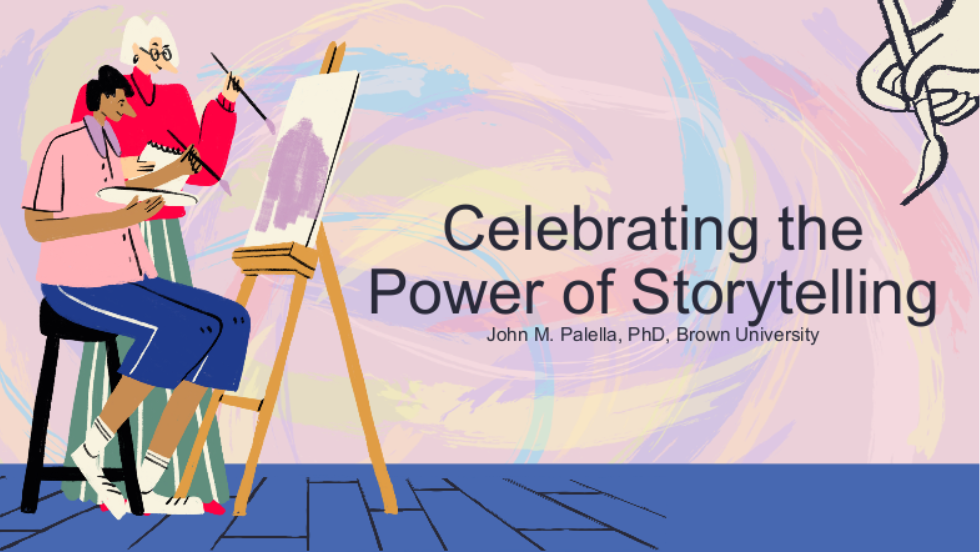For Professor John Palella, history is more than a subject. It’s a living narrative that shapes identities, builds connections, and fuels change. “Storytelling is not just about remembering the past,” he emphasizes. “It’s about empowerment and ensuring that lived experiences, particularly those of marginalized communities, are not just remembered but honored.”
Intergenerational Storytelling and LGBTQ+ Advocacy
Palella actively collaborates with Pride in Aging RI, an organization dedicated to enhancing the quality of life for LGBTQ+ elders. Through this work, he has come to appreciate the profound necessity of intergenerational storytelling, describing it as “transactional, mutual, and symbiotic.” By connecting past and present struggles, these shared narratives pave the way for a more inclusive future.
Believing that storytelling is the heart of social justice education, Palella asserts, “Facts alone do not move people, but stories do.” This conviction drives his involvement with Courageous RI and MediaEdLab, two organizations advancing media literacy education. Whether in his advocacy or in the classroom, he encourages future educators to approach history as an ongoing dialogue, challenging dominant narratives and amplifying voices that have long been underrepresented.
For LGBTQ+ communities, Palella claims storytelling has always been an act of self-representation and survival. He sees digital media as a powerful extension of this tradition. “LGBTQ+ people built their own archives: diaries, letters, underground newspapers, activist zines,” he explains. “Today, social media, podcasts, and digital storytelling platforms allow LGBTQ+ individuals to share their experiences with a global audience.” At Pride in Aging RI, Palella ensures that the voices of LGBTQ+ elders remain a vital part of contemporary conversations.
Advancing Inclusive Education and Policy
Palella urges people to look beyond the traditional milestones of LGBTQ+ history and recognize how the past informs the present. He compares the 1950s Lavender Scare—when LGBTQ+ federal employees were purged—to modern attacks on trans rights, showing how fear and misinformation persist. Similarly, he connects the direct-action activism of ACT UP in the 1980s and 1990s—when LGBTQ+ advocates demanded action during the height of the AIDS crisis—to the grassroots organizing seen today against anti-LGBTQ+ policies. Palella sees history as a guidebook rather than a static record. “Storytelling reminds us that we are not alone, that we are part of something bigger,” he says. “It gives us the blueprints, or as I say to my students, ‘the magical portal’ for fighting for a more just world.”
Palella’s dedication to inclusive education extends to his role as a co-editor for Social Education, the flagship publication of the National Council for the Social Studies. Through his column, Inclusive Social Studies, he aims to amplify justice-centered, equity-driven teaching. Just as his work with Pride in Aging RI, Courageous RI, and MediaEdLab reinforces the importance of storytelling, his editorial role allows him to “shape the broader national conversation about how we teach history, whose voices we prioritize, and how we expand our collective understanding of the past to build a more just future.”
His leadership played a crucial role in Rhode Island’s 2023 Social Studies Standards, which center on intersectional identity. “Rhode Island stands out as a leader,” Palella states. “We have codified DEI into our state-mandated learning standards, ensuring that all students and educators have the right to engage with a history that reflects the full diversity of human experience.” In practice, this means that Rhode Island teachers can teach histories of historically liberated communities as core components of the curriculum.
Media Literacy and the Fight for Representation
At the Media Literacy is for Everyone PBS summit this past year, Palella was a featured speaker. Reflecting on the event, he remarked, “The stories we tell, and the ones we fail to tell, shape public understanding of marginalized communities.” He emphasized that media literacy is a contested space, not a fixed narrative, and discussed the ongoing challenges of misinformation, AI in media, and school TikTok bans. The summit reinforced his belief that “storytelling, whether through history, media, or education, remains one of our most powerful tools for truth, representation, and justice.”
Palella’s work is rooted in the conviction that storytelling is an act of defiance. He often asks, “What’s the story you want to tell?”, a challenge to ensure that no history is erased and that every voice is heard.
